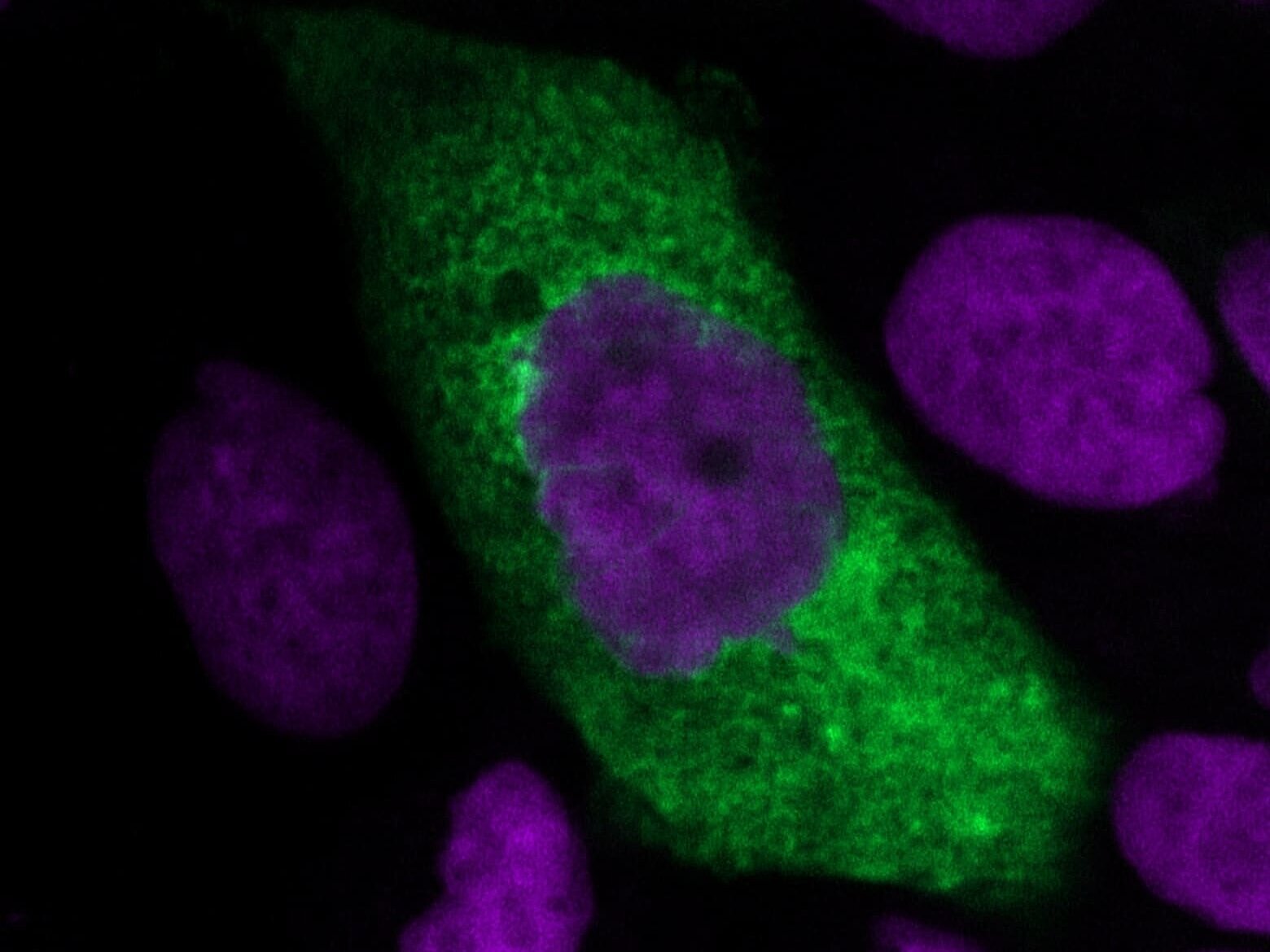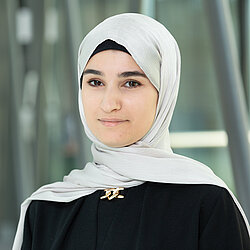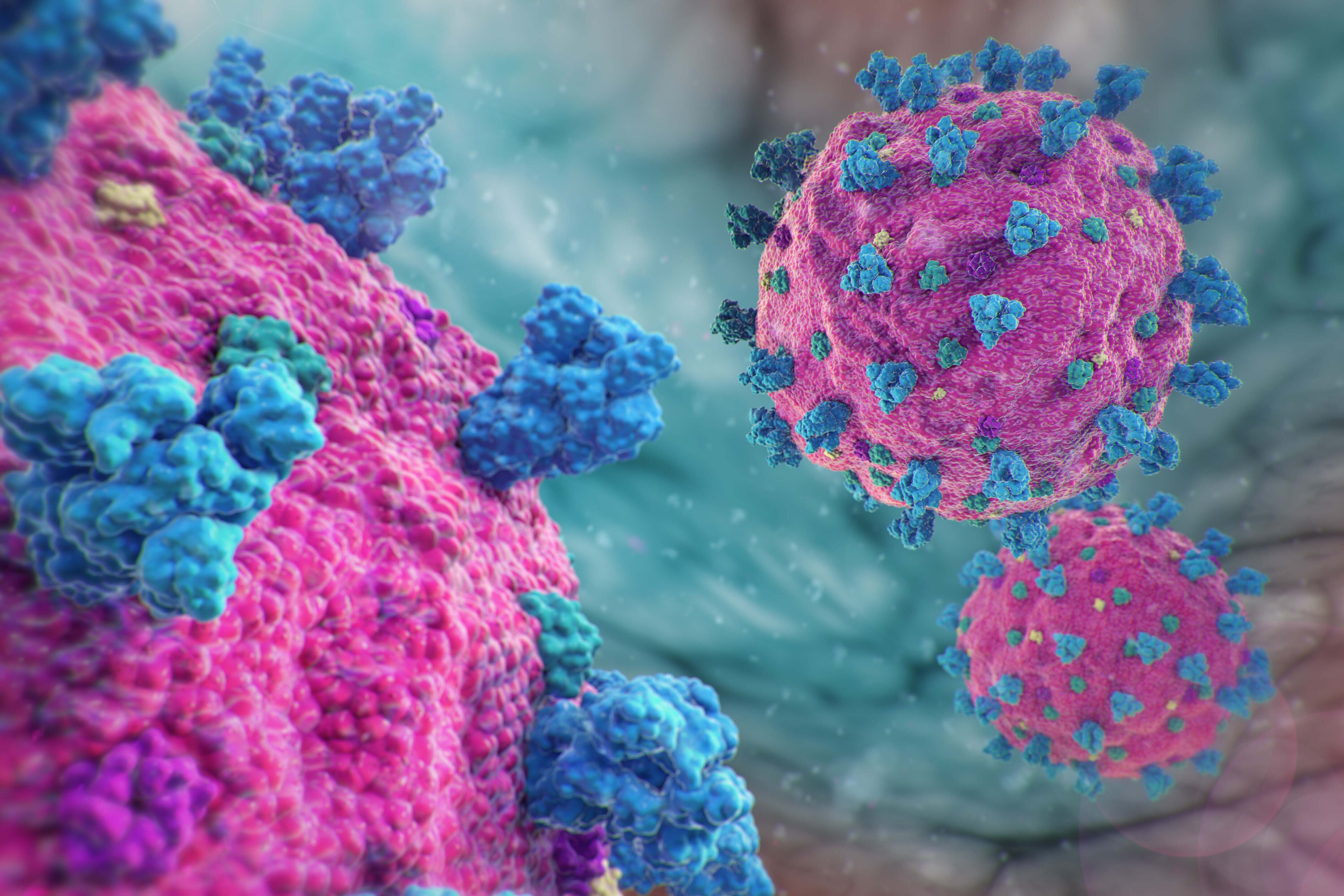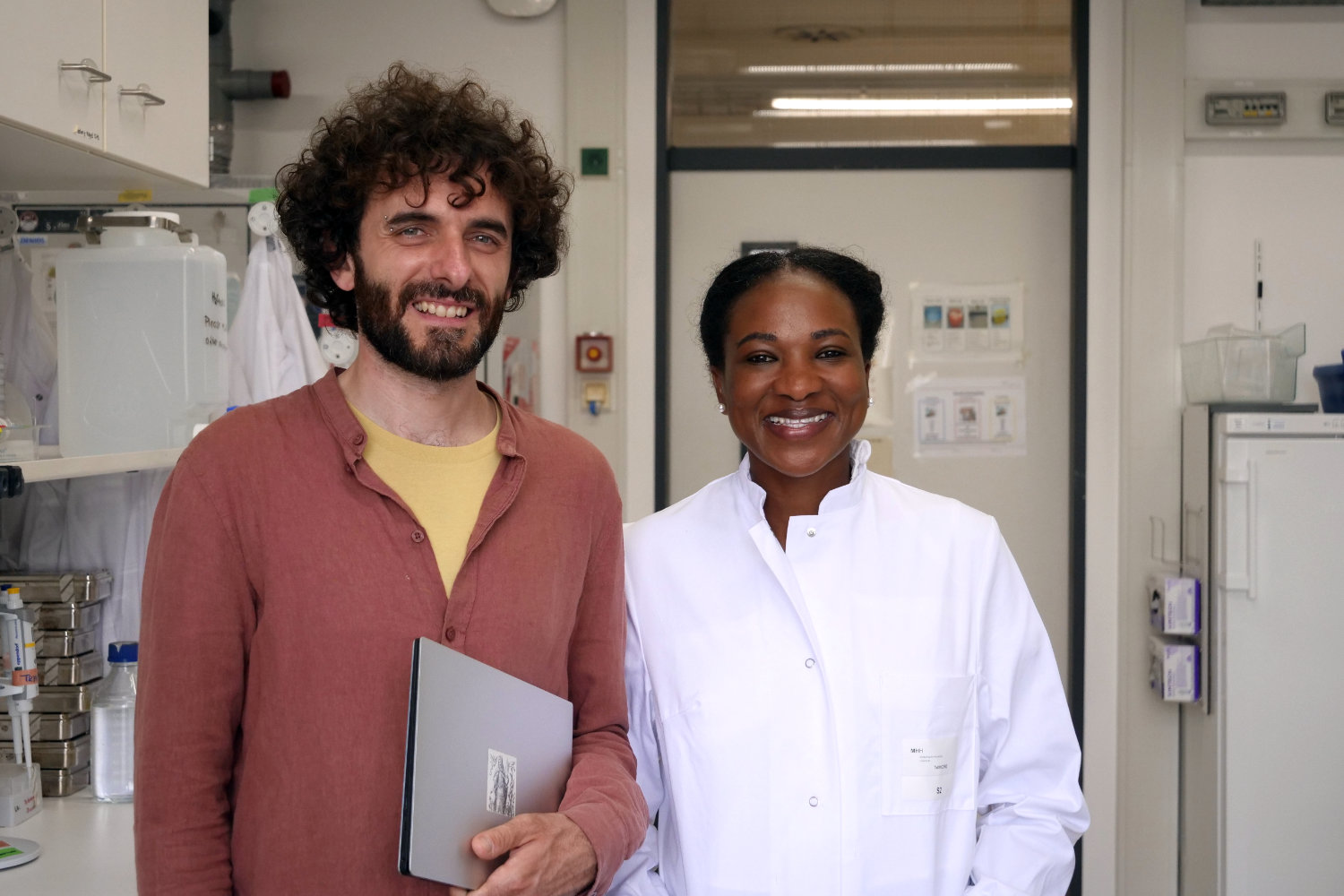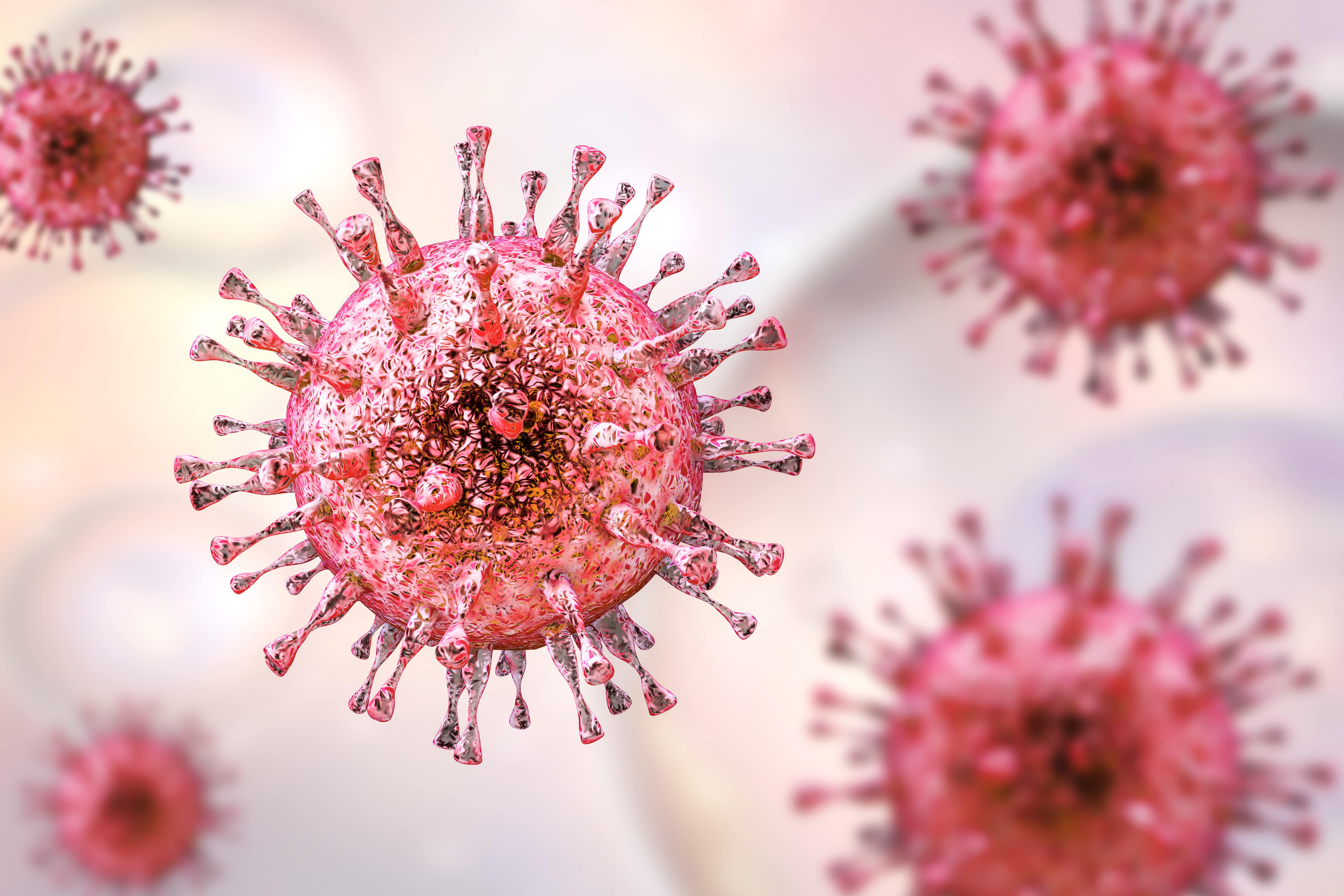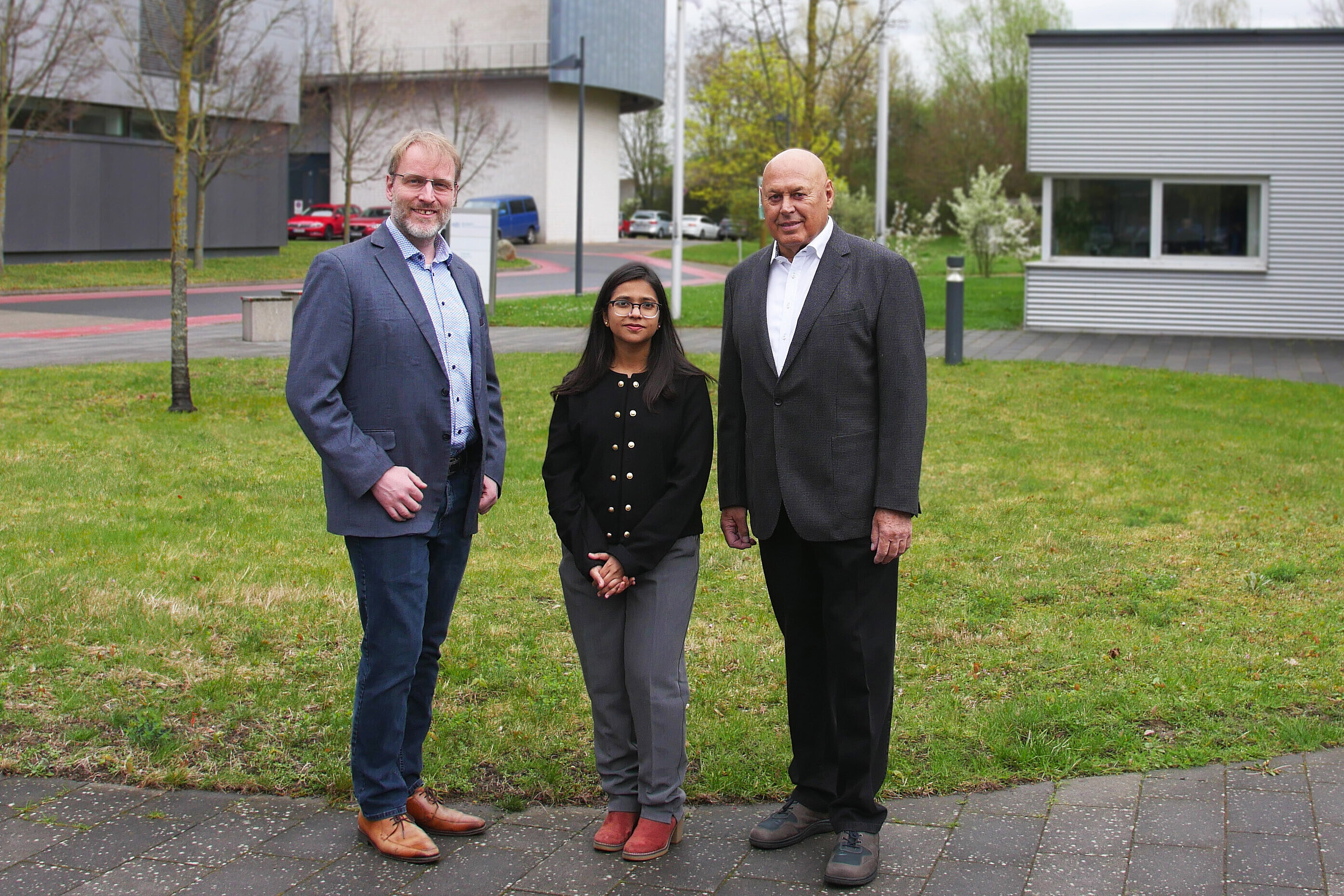Author count: 9
Krstanovic F., Mihalic A., Rashidi A.S., Sitnik K.M., Ruzsics Z., Cicin-Sain L., Verjans G.M.G.M., ... , Jonjic S., Brizic I.
(2025)
Neuron-restricted cytomegalovirus latency in the central nervous system regulated by CD4(+) T-cells and IFN-γ
J.Neuroinflammation.,
22
(1)
Author count: 17
van der Sluis R.M., Garcia-Rodriguez J.L., Nielsen I.H., Gris-Oliver A., Becker J., Costa B., Chaudhry M.Z., Werner M., Laustsen A., Pedersen J.G., Gammelgaard K.R., Mogensen T.H., Kalinke U., Cicin-Sain L., Bak R.O., ... , Kristensen L.S., Jakobsen M.R.
(2025)
Distinctive CD8+ T cell activation by antigen-presenting plasmacytoid dendritic cells compared to conventional dendritic cells
Cell Rep.,
44
(3)
Author count: 11
Hundhausen N., Majumder S., Xiao Y., Haeusl S.S., Goehler H., Seal R., Chiarolla C.M., Rosenwald A., Eyrich M., ... , Cicin-Sain L., Berberich-Siebelt F.
(2025)
NFAT single-deficient murine T cells reduce the risk of aGvHD while controlling cytomegalovirus infection
iScience,
28
(2)
Author count: 16
Bdeir N., Lüddecke T., Maaß H., Schmelz S., Rand U., Jacobsen H., Metzdorf K., Kulkarni U., Cossmann A., Stankov M.V., Hoffmann M., Pöhlmann S., Blankenfeldt W., Dopfer-Jablonka A., ... , Behrens G.M.N., Cicin-Sain L.
(2025)
Reverse mutational scanning of SARS-CoV-2 spike BA.2.86 identifies epitopes contributing to immune escape from polyclonal sera
Nat Commun,
16
(1)
Author count: 6
Katzmarzyk M., Naughton R., Sitaras I., Jacobsen H., Higdon M.M., Deloria Knoll M.
(2024)
Evaluating the Quality of Studies Assessing COVID-19 Vaccine Neutralizing Antibody Immunogenicity
Vaccines,
12
(11)
Author count: 21
Yu Z., Sasidharan-Nair V., Buchta T., Bonifacius A., Khan F., Pietzsch B., Ahmadi H., Beckstette M., Niemz J., Hilgendorf P., Mausberg P., Keller A., Falk C., Busch D.H., Schober K., Cicin-Sain L., Müller F., Brinkmann M.M., Eiz-Vesper B., ... , Floess S., Huehn J.
(2024)
DNA methylation profiling identifies TBKBP1 as potent amplifier of cytotoxic activity in CMV-specific human CD8+ T cells
PLoS.Pathog.,
20
(9)
Author count: 8
Innocenti G., Obara M., Costa B., Jacobsen H., Katzmarzyk M., Cicin-Sain L., ... , Kalinke U., Galardini M.
(2024)
Real-time identification of epistatic interactions in SARS-CoV-2 from large genome collections
Genome Biology,
25
(1)
Author count: 8
Khan F., Müller T.R., Kasmapour B., Ynga-Durand M.A., Eiz-Vesper B., Von Einem J., ... , Busch D.H., Cicin-Sain L.
(2024)
Dynamic monitoring of viral gene expression reveals rapid antiviral effects of CD8 T cells recognizing the HCMV-pp65 antigen
Frontiers in Immunology,
15
Author count: 21
Metzdorf K., Jacobsen H., Kim Y., Teixeira Alves L.G., Kulkarni U., Brdovcak M.C., Materljan J., Eschke K., Chaudhry M.Z., Hoffmann M., Bertoglio F., Ruschig M., Hust M., Sustic M., Krmpotic A., Jonjic S., Widera M., Ciesek S., Pöhlmann S., ... , Landthaler M., Cicin-Sain L.
(2024)
A single-dose MCMV-based vaccine elicits long-lasting immune protection in mice against distinct SARS-CoV-2 variants
Frontiers in Immunology,
15
Author count: 9
Winterhalter P.M., Warmuth L., Hilgendorf P., Schütz J.M., Dötsch S., Tonn T., Cicin-Sain L., ... , Busch D.H., Schober K.
(2024)
HLA reduction of human T cells facilitates generation of immunologically multicompatible cellular products
Blood Advances,
8
(13)
Author count: 17
Santamorena M.M., Tischer-Zimmermann S., Bonifacius A., Mireisz C.N.-M., Costa B., Khan F., Kulkarni U., Lauruschkat C.D., Sampaio K.L., Stripecke R., Blasczyk R., Maecker-Kolhoff B., Kraus S., Schlosser A., Cicin-Sain L., ... , Kalinke U., Eiz-Vesper B.
(2024)
Engineered HCMV-infected APCs enable the identification of new immunodominant HLA-restricted epitopes of anti-HCMV T-cell immunity
HLA,
103
(6)
Author count: 13
Maaß H., Ynga-Durand M., Milosevic M., Krstanovic F., Matesic M.P., Zuza I., Jonjic S., Brizic I., Sustic A., Bloos F., SepNet Critical Care Trials Group, ... , Protic A., Cicin-Sain L.
(2024)
Serum cytokine dysregulation signatures associated with COVID-19 outcomes in high mortality intensive care unit cohorts across pandemic waves and variants
Sci.Rep.,
14
(1)
Author count: 31
Becker B., Wottawa F., Bakr M., Koncina E., Mayr L., Kugler J., Yang G., Windross S.J., Neises L., Mishra N., Harris D., Tran F., Welz L., Schwärzler J., Banki Z., Stengel S.T., Ito G., Krötz C., Coleman O.I., Jaeger C., Haller D., Paludan S.R., Blumberg R., Kaser A., Cicin-Sain L., Schreiber S., Adolph T.E., Letellier E., Rosenstiel P., ... , Meiser J., Aden K.
(2024)
Serine metabolism is crucial for cGAS-STING signaling and viral defense control in the gut
iScience,
27
(3)
Author count: 5
Chaudhry M.Z., Borkner L., Kulkarni U., Berberich-Siebelt F., Cicin-Sain L.
(2024)
NFAT signaling is indispensable for persistent memory responses of MCMV-specific CD8+ T cells
PLoS Pathogens,
20
(2 / February)
Author count: 16
Costa B., Becker J., Krammer T., Mulenge F., Duran V., Pavlou A., Gern O.L., Chu X., Li Y., Cicin-Sain L., Eiz-Vesper B., Messerle M., Dölken L., Saliba A.E., ... , Erhard F., Kalinke U.
(2024)
Human cytomegalovirus exploits STING signaling and counteracts IFN/ISG induction to facilitate infection of dendritic cells
Nat.Commun.,
15
(1)
Author count: 20
Alfi O., Cohen M., Bar-On S., Hashimshony T., Levitt L., Raz Y., Blecher Y., Chaudhry M.Z., Cicin-Sain L., Ben-El R., Oiknine-Djian E., Lahav T., Vorontsov O., Cohen A., Zakay-Rones Z., Daniel L., Berger M., Mandel-Gutfreund Y., ... , Panet A., Wolf D.G.
(2024)
Decidual-tissue-resident memory T cells protect against nonprimary human cytomegalovirus infection at the maternal-fetal interface
Cell Rep.,
43
(2)
Author count: 18
Zhang L., Kempf A., Nehlmeier I., Cossmann A., Richter A., Bdeir N., Graichen L., Moldenhauer A.S., Dopfer-Jablonka A., Stankov M.V., Simon-Loriere E., Schulz S.R., Jäck H.M., Cicin-Sain L., Behrens G.M.N., Drosten C., ... , Hoffmann M., Pöhlmann S.
(2024)
SARS-CoV-2 BA.2.86 enters lung cells and evades neutralizing antibodies with high efficiency
Cell,
187
(3)
Author count: 1
Cicin-Sain L.
(2023)
Effects and safety profile of childhood vaccines in the light of the biological basis of the immune response
Lijec.Vjesn.,
145
Author count: 8
Katzmarzyk M., Clesle D.C., van den Heuvel J., Hoffmann M., Garritsen H., Pöhlmann S., ... , Jacobsen H., Cicin-Sain L.
(2023)
Systematical assessment of the impact of single spike mutations of SARS-CoV-2 Omicron sub-variants on the neutralization capacity of post-vaccination sera
Front.Immunol.,
14
Author count: 20
Abassi L., Bertoglio F., Macak Safranko Z, Schirrmann T., Greweling-Pils M., Seifert O., Khan F., Katzmarzyk M., Jacobsen H., Gödecke N., Heine P.A., Frenzel A., Nowack H., Dübel S., Kurolt I.C., Kontermann R.E., Markotic A., Schubert M., ... , Hust M., Cicin-Sain L.
(2023)
Evaluation of the Neutralizing Antibody STE90-C11 against SARS-CoV-2 Delta Infection and Its Recognition of Other Variants of Concerns
Viruses,
15
(11)
Author count: 7
Jacobsen H., Sitaras I., Katzmarzyk M., Cobos Jimenez V., Naughton R., ... , Higdon M.M., Knoll M.D.
(2023)
Systematic review and meta-analysis of the factors affecting waning of post-vaccination neutralizing antibody responses against SARS-CoV-2
npj Vaccines,
8
(1)
Author count: 9
Jiang B., Schmitt M.J., Rand U., Company C., Dramaretska Y., Grossmann M., Serresi M., ... , Cicin-Sain L., Gargiulo G.
(2023)
Pharmacological modulators of epithelial immunity uncovered by synthetic genetic tracing of SARS-CoV-2 infection responses
Sci.Adv.,
9
(25)
Author count: 9
Sitnik K.M., Krstanovic F., Gödecke N., Rand U., Kubsch T., Maaß H., Kim Y., ... , Brizic I., Cicin-Sain L.
(2023)
Fibroblasts are a site of murine cytomegalovirus lytic replication and Stat1-dependent latent persistence in vivo
Nat.Commun.,
14
(1)
Author count: 14
Metzdorf K., Jacobsen H., Greweling-Pils M.C., Hoffmann M., Lüddecke T., Miller F., Melcher L., Kempf A.M., Nehlmeier I., Bruder D., Widera M., Ciesek S., ... , Pöhlmann S., Cicin-Sain L.
(2023)
TMPRSS2 Is Essential for SARS-CoV-2 Beta and Omicron Infection
Viruses,
15
(2)
Author count: 12
Dötsch S., Svec M., Schober K., Hammel M., Wanisch A., Gökmen F., Jarosch S., Warmuth L., Barton J., Cicin-Sain L., ... , D'Ippolito E., Busch D.H.
(2023)
Long-term persistence and functionality of adoptively transferred antigen-specific T cells with genetically ablated PD-1 expression
Proc.Natl.Acad.Sci.U.S.A.,
120
(10)
Author count: 15
Schwerk J., Kemper L., Bussey K.A., Lienenklaus S., Weiss S., Cicin-Sain L., Kröger A., Kalinke U., Collins C.M., Speck S.H., Messerle M., Wirth D., Brinkmann M.M., ... , Hauser H., Köster M.
(2022)
Type I Interferon Signaling Controls Gammaherpesvirus Latency In Vivo
Pathogens,
11
(12)
Author count: 13
Keller L., Oueis E., Kaur A., Safaei N., Kirsch S.H., Gunesch A.P., Haid S., Rand U., Cicin-Sain L., Fu C., Wink J., ... , Pietschmann T., Müller R.
(2022)
Persicamidines - Unprecedented Sesquarterpenoids with Potent Antiviral Bioactivity against Coronaviruses
Angew.Chem.Int.Ed Engl.
Author count: 6
Sitaras I., Jacobsen H., Higdon M.M., Dowling W.E., Bar-Zeev N., Deloria Knoll M.
(2022)
Systematic review of primary and booster COVID-19 sera neutralizing ability against SARS-CoV-2 omicron variant
npj Vaccines,
7
(1)
Author count: 30
Jacobsen H., Strengert M., Maaß H., Ynga Durand M.A., Katzmarzyk M., Kessel B., Harries M., Rand U., Abassi L., Kim Y., Lüddecke T., Metzdorf K., Hernández P., Ortmann J., Heise J.K., Castell S., Gornyk D., Glöckner S., Melhorn V., Kemmling Y., Lange B., Dulovic A., Marsall P., Häring J., Junker D., Schneiderhan-Marra N., Hoffmann M., Pöhlmann S., ... , Krause G., Cicin-Sain L.
(2022)
Diminished neutralization responses towards SARS-CoV-2 Omicron VoC after mRNA or vector-based COVID-19 vaccinations
Sci.Rep.,
12
(1)
Author count: 7
Jacobsen H., Katzmarzyk M., Higdon M.M., Jiménez V.C., Sitaras I., ... , Bar-Zeev N., Knoll M.D.
(2022)
Post-Vaccination Neutralization Responses to Omicron Sub-Variants
Vaccines,
10
(10)
Author count: 20
Brlic P.K., Pavletic M., Lerga M., Krstanovic.F., Matesic M.P., Miklic K., Malic S., Miksa L., Pajcur M., Peruc D., Schubert M., Bertoglio F., Arapovic J., Protic A., Sustic A, Milosevic M, Cicin-Sain L., Jonjic S., ... , Lisnic V., Brizic I.
(2022)
SARS-CoV-2 Spike and Nucleocapsid Antibody Response in Vaccinated Croatian Healthcare Workers and Infected Hospitalized Patients: A Single Center Cohort Study
Viruses,
14
(9)
Author count: 7
Jacobsen H., Cobos Jiménez, Sitaras I., Bar-Zeev N., Cicin-Sain L., ... , Higdon M.M., Deloria-Knoll M.
(2022)
Post-vaccination T cell immunity to omicron
Front.Immunol.,
13
Author count: 26
Pardieck I.N., van der Sluis T.C., van der Gracht E.T.I., Veerkamp D.M.B., Behr F.M., van Duikeren S., Beyrend G., Rip J., Nadafi R., Beyranvand Nejad E., Mülling N., Brasem D.J., Camps M.G.M., Myeni S.K., Bredenbeek P.J., Kikkert M., Kim Y., Cicin-Sain L., Abdelaal T., van Gisbergen K.P.J.M., Franken K.L.M.C., Drijfhout J.W., Melief C.J.M., Zondag G.C.M., ... , Ossendorp F., Arens R.
(2022)
A third vaccination with a single T cell epitope confers protection in a murine model of SARS-CoV-2 infection
Nat.Commun.,
13
(1)
Author count: 9
Jacobsen H., Sitaras I., Jurgensmeyer M., Mulders M.N., Goldblatt D., Feikin D.R., Bar-Zeev N., ... , Higdon M.M., Knoll M.D.
(2022)
Assessing the Reliability of SARS-CoV-2 Neutralization Studies That Use Post-Vaccination Sera
Vaccines.(Basel),
10
(6)
Author count: 10
Ynga-Durand M., Maaß H., Milosevic M., Krstanovic F., Pribanic Matesic M., Jonjic S., Protic A., Brizic I., ... , Sustic A., Cícín-Saín L.
(2022)
SARS-CoV-2 Viral Load in the Pulmonary Compartment of Critically Ill COVID-19 Patients Correlates with Viral Serum Load and Fatal Outcomes
Viruses.,
14
(6)
Author count: 15
Ballmann R., Hotop S.K., Bertoglio F., Steinke S., Heine P.A., Chaudhry M.Z., Jahn D., Pucker B., Baldanti F., Piralla A., Schubert M., Cícín-Saín L., Brönstrup M., ... , Hust M., Dübel S.
(2022)
ORFeome Phage Display Reveals a Major Immunogenic Epitope on the S2 Subdomain of SARS-CoV-2 Spike Protein
Viruses.,
14
(6)
Author count: 4
Khorenko M., Rand U., Cicin-Sain L., Feldmann C.
(2022)
Foscarnet-Type Inorganic-Organic Hybrid Nanoparticles for Effective Antiviral Therapy
ACS Biomater.Sci Eng,
8
(4)
Author count: 16
Hotop S.K., Reimering S., Shekhar A., Asgari E., Beutling U., Dahlke C., Fathi A., Khan F., Lütgehetmann M., Ballmann R., Gerstner A., Tegge W., Cicin-Sain L., Bilitewski U., ... , McHardy A.C., Brönstrup M.
(2022)
Peptide microarrays coupled to machine learning reveal individual epitopes from human antibody responses with neutralizing capabilities against SARS-CoV-2
Emerg.Microbes Infect,
11
(1)
Author count: 20
Cokaric Brdovcak M., Materljan J., Sustic M., Ravlic S., Ruzic T., Lisnic B., Miklic K., Brizic I., Matesic M.P., Lisnic V.J., Halassy B., Roncevic D., Knezevic Z., Stefan L., Bertoglio F., Schubert M., Cicin-Sain L., Markotic A., ... , Jonjic S., Krmpotic A.
(2022)
ChAdOx1-S adenoviral vector vaccine applied intranasally elicits superior mucosal immunity compared to the intramuscular route of vaccination
Eur J Immunol
Author count: 28
Schubert M., Bertoglio F., Steinke S., Heine P.A., Ynga-Durand M.A., Maass H., Sammartino J.C., Cassaniti I., Zuo F., Du L., Korn J., Milosevic M., Wenzel E.V., Krstanovic F., Polten S., Pribanic-Matesic M., Brizic I., Baldanti F., Hammarström L., Dübel S., Sustic A, Marcotte H., Strengert M., Protic A., Piralla A., Pan-Hammarström Q., ... , Cicin-Sain L., Hust M.
(2022)
Human serum from SARS-CoV-2-vaccinated and COVID-19 patients shows reduced binding to the RBD of SARS-CoV-2 Omicron variant
BMC Med.,
20
(1)
Author count: 4
Wöhrle F., Kerscher B., Cicin-Sain L., Bekeredjian-Ding I.
(2022)
DGfI Study Group Vaccines - Annual Meeting 2022
Eur.J.Immunol.,
52
(3)
Author count: 10
Baliu-Piqué M., Drylewicz J., Zheng X., Borkner L., Swain A.C., Otto S.A., de Boer R.J., Tesselaar K., ... , Cicin-Sain L., Borghans J.A.M.
(2022)
Turnover of Murine Cytomegalovirus-Expanded CD8(+) T Cells Is Similar to That of Memory Phenotype T Cells and Independent of the Magnitude of the Response
J.Immunol.,
208
(4)
Author count: 21
Kim Y., Zheng X., Eschke K., Chaudhry M.Z., Bertoglio F., Tomic A., Krmpotic A., Hoffmann M., Bar-On Y., Boehme J., Bruder D., Ebensen T., Brunotte L., Ludwig S., Messerle M., Guzmán C., Mandelboim O., Hust M., Pöhlmann S., ... , Jonjic S., Cicin-Sain L.
(2022)
MCMV-based vaccine vectors expressing full-length viral proteins provide long-term humoral immune protection upon a single-shot vaccination
Cell Mol.Immunol.,
19
(2)
Author count: 12
Chaudhry M.Z., Eschke K., Hoffmann M., Grashoff M., Abassi L., Kim Y., Brunotte L., Ludwig S., Kröger A., Klawonn F., ... , Pöhlmann S.H., Cicin-Sain L.
(2022)
Rapid SARS-CoV-2 Adaptation to Available Cellular Proteases
J.Virol.
Author count: 193
Cossarizza A., Chang H.D., Radbruch A., Abrignani S., Addo R., Akdis M., Andrä I., Andreata F., Annunziato F., Arranz E., Bacher P., Bari S., Barnaba V., Barros-Martins J., Baumjohann D., Beccaria C.G., Bernardo D., Boardman D.A., Borger J., Böttcher C., Brockmann L., Burns M., Busch D.H., Cameron G., Cammarata I., Cassotta A., Chang Y., Chirdo F.G., Christakou E., Cicin-Sain L., Cook L., Corbett A.J., Cornelis R., Cosmi L., Davey M.S., De Biasi S., De Simone G., Del Zotto G., Delacher M., Di Rosa F., Santo J.D., Diefenbach A., Dong J., Dörner T., Dress R.J., Dutertre C.A., Eckle S.B.G., Eede P., Evrard M., Falk C.S., Feuerer M., Fillatreau S., Fiz-Lopez A., Follo M., Foulds G.A., Fröbel J., Gagliani N., Galletti G., Gangaev A., Garbi N., Garrote J.A., Geginat J., Gherardin N.A., Gibellini L., Ginhoux F., Godfrey D.I., Gruarin P., Haftmann C., Hansmann L., Harpur C.M., Hayday A.C., Heine G., Hernandez D.C., Herrmann M., Hoelsken O., Huang Q., Huber S., Huber J.E., Hühn J., Hundemer M., Hwang W.Y.K., Iannacone M., Ivison S.M., Jäck H.M., Jani P.K., Keller B., Kessler N., Ketelaars S., Knop L., Knopf J., Koay H.F., Kobow K., Kriegsmann K., Kristyanto H., Krueger A., Kuehne J.F., Kunze-Schumacher H., Kvistborg P., Kwok I., Latorre D., Lenz D., Levings M.K., Lino A.C., Liotta F., Long H.M., Lugli E., MacDonald K.N., Maggi L., Maini M.K., Mair F., Manta C., Manz R.A., Mashreghi M.F., Mazzoni A., McCluskey J., Mei H.E., Melchers F., Melzer S., Mielenz D., Monin L., Moretta L., Multhoff G., Munoz L.E., Munoz-Ruiz M., Muscate F., Natalini A., Neumann K., Ng L.G., Niedobitek A., Niemz J., Almeida L.N., Notarbartolo S., Ostendorf L., Pallett L.J., Patel A.A., Percin G.I., Peruzzi G., Pinti M., Pockley A.G., Pracht K., Prinz I., Pujol-Autonell I., Pulvirenti N., Quatrini L., Quinn K.M., Radbruch H., Rhys H., Rodrigo M.B., Romagnani C., Saggau C., Sakaguchi S., Sallusto F., Sanderink L., Sandrock I., Schauer C., Scheffold A., Scherer H.U., Schiemann M., Schildberg F.A., Schober K., Schoen J., Schuh W., ler T., Schulz A.R., Schulz S., Schulze J., Simonetti S., Singh J., Sitnik K.M., Stark R., Starossom S., Stehle C., Szelinski F., Tan L., Tarnok A., Tornack J., Tree T.I.M., van Beek J.J.P., van de Veen W., van Gisbergen K., Vasco C., Verheyden N.A., von Borstel A., Ward-Hartstonge K.A., Warnatz K., Waskow C., Wiedemann A., Wilharm A., Wing J., Wirz O., Wittner J., ... , Yang J.H.M., Yang J.
(2021)
Guidelines for the use of flow cytometry and cell sorting in immunological studies (third edition)
Eur.J.Immunol.,
51
(12)
Author count: 14
Pezoldt J., Wiechers C., Erhard F., Rand U., Bulat T., Beckstette M., Brendolan A., Hühn J., Kalinke U., Mueller M., Strobl B., Deplancke B., ... , Cicin-Sain L., Sitnik K.M.
(2021)
Single-cell transcriptional profiling of splenic fibroblasts reveals subset-specific innate immune signatures in homeostasis and during viral infection
Commun.Biolog.,
4
(1)
Author count: 9
Zimmer M.M., Kibe A., Rand U., Pekarek L., Ye L., Buck S., Smyth R.P., ... , Cicin-Sain L., Caliskan N.
(2021)
The short isoform of the host antiviral protein ZAP acts as an inhibitor of SARS-CoV-2 programmed ribosomal frameshifting
Nat.Commun.,
12
(1)
Author count: 9
Olbrich L., Stockdale L., Basu Roy R., Song R., Cicin-Sain L., Whittaker E., Prendergast A.J., ... , Fletcher H., Seddon J.A.
(2021)
Understanding the interaction between cytomegalovirus and tuberculosis in children: The way forward
PLoS.Pathog.,
17
(12)
Author count: 21
Flommersfeld S., Böttcher J.P., Ersching J., Flossdorf M., Meiser P., Pachmayr L.O., Leube J., Hensel I., Jarosch S., Zhang Q., Chaudhry M.Z., Andrae I., Schiemann M., Busch D.H., Cicin-Sain L., Sun J.C., Gasteiger G., Victora G.D., Höfer T., ... , Buchholz V.R., Grassmann S.
(2021)
Fate mapping of single NK cells identifies a type 1 innate lymphoid-like lineage that bridges innate and adaptive recognition of viral infection
Immunity.
Author count: 4
Lavin D.P., Abassi L., Inayatullah M., Tiwari V.K.
(2021)
Mnt represses epithelial identity to promote Epithelial to Mesenchymal Transition
Mol.Cell Biol.
Author count: 19
Müller T.R., Jarosch S., Hammel M., Leube J., Grassmann S., Bernard B., Effenberger M., Andrä I., Chaudhry M.Z., Käuferle T., Malo A., Cicin-Sain L., Steinberger P., Feuchtinger T., Protzer U., Schumann K., Neuenhahn M., ... , Schober K., Busch D.H.
(2021)
Targeted T cell receptor gene editing provides predictable T cell product function for immunotherapy
Cell Rep.Med.,
2
(8)
Author count: 9
Rand U., Kupke S.Y., Shkarlet H., Hein M.D., Hirsch T., Marichal-Gallardo P., Cicin-Sain L., ... , Reichl U., Bruder D.
(2021)
Antiviral Activity of Influenza A Virus Defective Interfering Particles against SARS-CoV-2 Replication In Vitro through Stimulation of Innate Immunity
Cells,
10
(7)
Author count: 41
Bertoglio F., Fühner V., Ruschig M., Heine P.A., Abassi L., Klünemann T., Rand U., Meier D., Langreder N., Steinke S., Ballmann R., Schneider K., Roth K.D.R., Kuhn P., Riese P., Schäckermann D., Korn J., Koch A., Chaudhry M.Z., Eschke K., Kim Y., Zock-Emmenthal S., Becker M., Scholz M., Moreira G.M.S.G., Wenzel E.V., Russo G., Garritsen H.S.P., Casu S., Gerstner A., Roth G., Adler J., Trimpert J., Hermann A., Schirrmann T., Dübel Stefan, Frenzel A., van den Heuvel J., Cicin-Sain L., ... , Schubert M., Hust M.
(2021)
A SARS-CoV-2 neutralizing antibody selected from COVID-19 patients binds to the ACE2-RBD interface and is tolerant to most known RBD mutations
Cell Rep.,
36
(4)
Author count: 17
Pommerenke C., Rand U., Uphoff C.C., Nagel S., Zaborski M., Hauer V., Kaufmann M., Meyer C., Denkmann S.A., Riese P., Eschke K., Kim Y., Safranko Z.M., Kurolt I.C., Markotic A., ... , Cicin-Sain L., Steenpass L.
(2021)
Identification of cell lines CL-14, CL-40 and CAL-51 as suitable models for SARS-CoV-2 infection studies
PLoS ONE,
16
(8)
